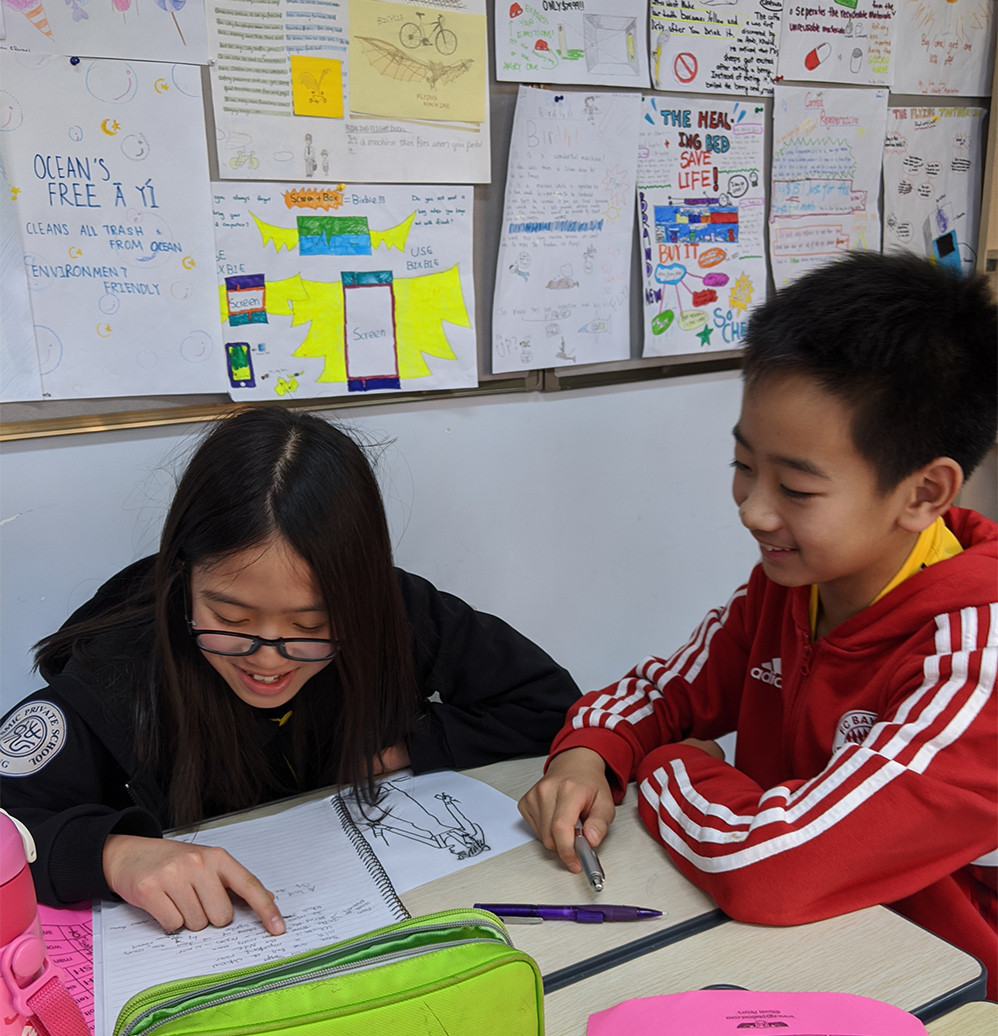English Curriculum

English Introduction:
The ELA Program at SMIC Beijing uses the Aero, or Common Core Plus, Standards. We practice competitive grouping, meaning that we have two levels of ELA classes per grade:
A level for Accelerated Students is meant to propel those students who are able to study advanced material at an accelerated pace in order to prepare them for AP courses at the high school level. Placement in these courses is determined based on a student’s ability to perform above the regular course average, demonstrate positive and eager learning attitudes, uphold academic honor, and demonstrate strong interest in the subject area.
B level for At Level Students is intended to enhance students’ ability to effectively communicate by guiding them through basic language skills, such as grammar, vocabulary, reading comprehension, writing, listening and speaking. At the end of this course, students should be transitioning into critical readers, logical thinkers, organized writers and active participants in all areas of academic English.
Elementary Curriculum
Grade 1 – Grade 5
Elementary students use McGraw Hill Reading and Harcourt Language textbooks, supplemented by an extensive collection of guided readers and novels. While ensuring our students are well prepared for the Stanford 10 in May, our teachers spend more time teaching students to love reading and express themselves fluently in writing, class discussions, and skits. Students have a weekly Library class, optional study hall in the Library each day, and opportunities to check out books throughout the day. The Happy Reader program rewards exceptional readers for answering questions before a panel of teachers and parents on the books they have read.
Middle School Curriculum
Grade 6
Literature:
-Focus placed on characteristics of basic genres (historical fiction, fantasy, realistic fiction, science fiction, etc), character analysis, identifying conflict and theme, recognizing symbolism and foreshadowing.
-Students will be able to identify end rhyme, rhyme scheme, alliteration and various types of figurative language.
-Focus placed on identifying the central idea, text structure, and key claims of informational texts.
-Students will be able to analyze an author’s techniques and how they effect the text as a whole, as well as provide evidence to support their analysis.
Composition:
-Focus is placed on basic grammar, identifying parts of speech, using correct verb tenses, and expanding adjective and adverb use to become more precise and descriptive.
-Students will learn to introduce claims and organize their reasons and evidence clearly, as well as develop their topic with relevant facts, definitions, concrete details, quotations, or
other information and examples.
-Focus is placed on using appropriate transitions to clarify the relationships among ideas and concepts.
-Students will be able to conduct short research projects drawing on several sources and refocusing the inquiry when appropriate.
Grade 7
Literature:
-Students will build upon their understanding of genres and basic literary elements. Comparing and contrasting genres, differentiating between different types of conflicts and different types of characters.
-Focus is placed on making connections between literary elements and using multiple pieces of evidence to support the student’s analysis. i.e. the author portrays this character in a certain way in order to better support the novel’s theme.
-In poetry, students will begin to identify different forms and analyze author’s word choice recognizing techniques such as using allusions and extended metaphors.
-Students will be able to read various informational texts over the same topic, comparing and contrasting the author’s purpose and presenting a summary free of bias.
Composition:
-Focus is placed on supporting claims with logical reasoning and relevant evidence, using accurate, credible sources.
-Students will be able to introduce a topic in a variety of ways, capturing the audience’s attention.
-Focus is placed on using narrative techniques, such as dialogue, pacing, and description, to develop experiences, events, and/or characters.
-Students will be able to shape their writing and redirect writing focusing on how well purpose
and audience have been addressed.
Grade 8
Literature:
-Students will begin to analyze how a theme develops over the course of a text, including its relationship to the characters, setting, and plot, as well as choose the evidence that most strongly supports their analysis.
-Focus is placed on determining the impact of specific incidents, dialogue, or word choice on the work as a whole.
-Students will compare and contrast the structure of two or more texts and analyze how the differing structure of each text contributes to its meaning and style.
-Students will analyze how an informational text makes connections among and distinctions between individuals, ideas, or events (e.g., through comparisons, analogies, or categories).
Composition:
-Focus is placed on distinguishing their own claims from alternate or opposing claims and identifying logical fallacies.
-Students will be able to organize ideas, concepts, and information into broader categories; as well as include formatting (e.g., headings), graphics, and multimedia when useful to aiding comprehension.
-Focus is placed on using a variety of transition words, phrases, and clauses to convey sequence, signal shifts from one time frame or setting to another, and show the relationships among experiences and events.
-Students will be able to conduct research projects to answer a question drawing on several sources and generating additional related, focused questions that allow for multiple avenues of exploration.
High School Curriculum
Grade 9
Literature:
-Focus is placed on citing strong and thorough textual evidence to support analysis of what the text says explicitly as well as inferences drawn from the text.
-Students will analyze the cumulative impact of specific word choices on meaning and tone (e.g., how the language evokes a sense of time and place; how it sets a formal or informal tone).
-Students will analyze how an author’s choices concerning how to structure a text and order
events within it, create such effects as mystery, tension, or surprise.
-Focus is placed on analyzing a particular point of view or cultural experience reflected in a work of literature.
Composition:
-Students will be able to develop claims and counterclaims fairly, supplying evidence for each while pointing out the strengths and limitations of both in a manner that anticipates the audience’s knowledge level and concerns.
-Focus is placed on organizing complex ideas, concepts, and information to make important connections and distinctions.
-Students will be able to create narratives using dialogue, pacing, description, reflection, and multiple plot lines.
-Focus is placed on narrowing or broadening research inquiries when appropriate and synthesizing multiple sources on the subject, demonstrating an understanding of the subject under investigation.
English 1 (Grade 9)
In English I Mainstream 9th grade students develop abilities to analyze complex texts, determine evidence, reason critically, and communicate thoughtfully—the must-have skills for college and career. With a digital and print approach, the course transcends the traditional with state-of-the-art features that resonate with today’s students.
English I Advanced helps 9th grade students develop abilities to analyze complex texts, determine evidence, reason critically, and communicate thoughtfully—the must-have skills for college and career. This course is designed to facilitate the necessary reading and writing skills for Advanced Placement courses.
English 2 (Grade 10)
In English II Mainstream 10th grade students develop their language arts skills in reading, writing, listening, and speaking. The textbook, novels and other resources will be utilized to help students garner a thorough understanding of literature, vocabulary, grammar, composition, and presentation skills.
English II Advanced helps 10th grade students focus on the close reading, analytical writing, and language skills with immediate relevance for students’ current and future work both inside and outside the classroom. Texts inspire and prepare students for close, critical reading. The course trains the reader to observe the small details within a text to arrive at a deeper understanding of the whole. It also trains the writer to focus on crafting complex sentences as the foundation for writing that facilitates complex thinking. Classroom work guides students to examine and appreciate authors’ choices, developing an awareness of how words produce effects and how the conventions of the English language are used for both precision and style.
English 3 (Grade 11)
English III Mainstream is an integrated English course that incorporates both the Common Core State Standards for English/Language Arts and Indiana’s Academic Standards for English/Language Arts into the curriculum. The course is a study of language, literature, composition, and oral communication with a focus on exploring characterization across universal themes, such as the American Dream, and a wide variety of genres. Students use literary interpretation, analysis, comparison, and evaluation to read and to respond to representative works of historical or cultural significance appropriate for Grade 11.
AP English III Lit and Comp helps 11th grade students learn to analyze and interpret imaginative literature through the careful reading and critical analysis of representative works from various genres and periods. Students explore literary elements such as a work’s structure, style and themes, as well as the use of figurative language, imagery, symbolism and tone. Develop your writing skills as you express your ideas and analysis in expository, analytical, and argumentative essays. Advanced Placement courses provide college-level material and instruction to prepare students for the optional externally-moderated exam in May. Success in this exam can lead to university credit in the United States.
Public Speaking, Debate and Forensics (Grades 9,10,11)
Students are introduced to public speaking as an important component of their academic, work, and social lives. Students study types of speeches (informative, persuasive, dramatic, and special occasion), read and listen to models of speeches, and prepare and present their own speeches. Students learn to choose speaking topics and adapt them for specific audiences, to research and support their ideas, and to benefit from listener feedback. They study how to incorporate well-designed visual and multimedia aids in presentations and how to maintain a credible presence in the digital world. Students also learn about the ethics of public speaking and about techniques for managing communication anxiety.
Informational Texts (Grades 9 & 10)
This course is designed to bring together engaging, accessible content with integrated assessments and insights to supercharge reading engagement and learning in every subject. Content covers non-fiction topics that today’s students care about, that connect to the core curriculum, and are aligned to standards. Learning to read informational materials and write appropriately in response are the aims of this course which is a prerequisite for Advanced Placement coursework.
English for Academic Purposes
The English for Academic Purposes (EAP) program has been established to support students whose English skills show promise for full participation in the Regular English courses. EAP courses develop necessary English proficiency and academic skills to enable full participation in SMIC HS-I Program. Students may take EAP courses for no more than two semesters, at which time they must attain the required proficiency levels for the Regular Program. Unlike Regular Program courses, EAP courses are graded on an “Achieved” (80-100% – pass) or “Not Yet” (0-79% – fail) scale. EAP courses do not carry credit toward graduation and are not included in GPA calculation.
Listening and Speaking (EAP)
This course is designed to hone aural and oral skills in English so that students are prepared for the rigors of regular English courses. The course will develop listening, note-taking, study and test-taking skills. Active listening, interactive and presentational oral skills will be another focus of the class. The student must successfully pass this course with a score of 80% or higher before being granted acceptance to the regular English program. This course does not count toward graduation requirements.
Extensive Reading and Response (EAP)
Extensive reading provides learners with rich background knowledge, vocabulary recognition skills, and higher motivation for more reading. In addition, it can also lead to the development of rapid reading skills, and the discovery of reading strategies. After each reading, students will be required to provide one of a variety of types of response to the literature, improving both their writing and presentational skills in preparation for full inclusion in regular English classes. The student must successfully pass this course with a score of 80% or higher before being granted acceptance to the regular English program. This course does not count toward graduation requirements.
Western study skills and habits (EAP)
The Study Skills program is designed to assist students learn, understand, and apply the skills and habits needed in western education. Students have the opportunity to develop and strengthen good study habits and learning strategies through various instructional methods and strategies. Study Skills is a support class for students in the EAP program in preparation for integration into regular high school classes. Emphasis is placed on core classes.




